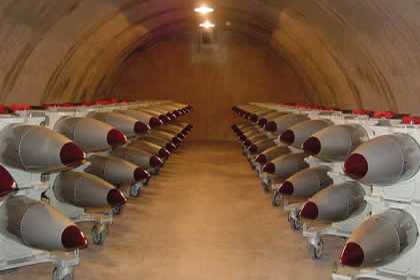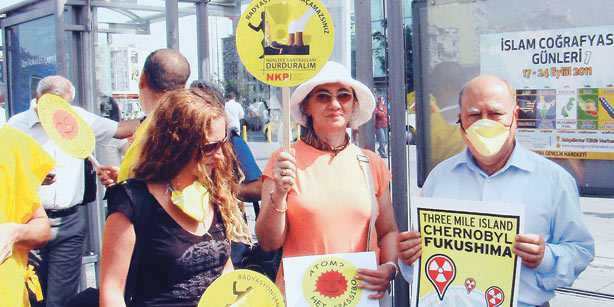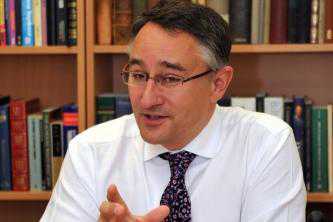December 1, 2011 – 4:08pm, by Yigal Schleifer
- The Turko-file
- Nuclear Security
- Turkish Foreign Policy
The homepage of the (newly, and poorly, redesigned) Hurriyet Daily News features a fairly provocative headline today: “Turkey given possession of nuclear warheads, report says.” So has Turkey just become the Middle East’s newest nuclear power? The real story is a lot less sensational, yet also much more interesting, than that.

Turkey, as a member of NATO, has in fact hosted tactical nuclear weapons since the 1950’s. Today, NATO keeps an estimated stockpile of 60-70 nuclear bombs at the Incirlik air base in southern Turkey, down from 90 in 2001. Most of these (some 50) are designed to be delivered by United States aircraft (which are not housed at Incirlik and would have to be flown in and armed for any mission). The rest are earmarked for Turkish fighter jets, although it appears that Turkish pilots are currently not being trained for nuclear missions. (Hurriyet’s sloppy story follows up on a more carefully written one that appeared the day before in the Vatan newspaper, written by Washington correspondent Ilhan Tanir.)
From an interesting report published at the end of last year by the Bulletin of the Atomic Scientists, which looked at the status of the the US’s tactical nuclear weapons in Europe, especially in light of NATO’s newly-developed “Strategic Concept,” which places less importance on these weapons:
There are conflicting reports about the status of the Turkish nuclear mission. Gen. Ergin Celasin, former commander (until 2001) of the Turkish Air Force, is on record stating that Turkey’s role in the NATO nuclear strike mission ended in the 1990s with the withdrawal of weapons from the national Turkish bases (Kibaroglu, 2010). In contrast, according to Pentagon sources, Turkey currently uses its F-16s to execute the nuclear mission. Moreover, until Turkey acquires a sufficient number of nuclear-capable JSFs over the 15 years, its F-16s are scheduled to receive a “stop-gap” upgrade to make them capable of carrying the new B61-12 bomb that will replace the B61-3/4 beginning in 2017.
The confusion about Turkey’s status may have to do with the aircraft’s degree of nuclear readiness, which has changed over time, ranging from full alert in the 1980s, to withdrawal from national bases in the 1990s, to today’s “pick up the weapons at Incirlik if needed” posture. During these phases, the aircraft status changed from nuclear-capable, certified, and loaded, to nuclear-capable and certified, to nuclear-capable. Today, the Turkish aircraft are nuclear-capable (according to US sources) but neither loaded nor certified. This, combined with the absence of a US wing at Incirlik AB, underscores the special status of the Turkish posture.
The subject of the nukes at Incirlik is not widely discussed in Turkey and most Turks are probably not aware of the weapons’ existence on their soil (take a look at this other report from the Bulletin for more on the specific case of Turkey’s nukes). It appears, though, that Ankara enjoys being under NATO’s nuclear umbrella (even if it’s a mostly closed one). For example, while Germany has pushed for the removal of the NATO nukes stored at one of its airbases, there has been little talk in Ankara about getting rid of the nuclear bombs at Incirlik. “Turkey has stressed that any decision to removal of NATO’s forward deployed nuclear weapons must be an alliance-wide decision and it does not seem that anyone in Ankara is excited by the idea of their removal,” says Aaron Stein, a a nonproliferation expert based in Turkey.
“Any talk of removing these weapons is premature and should be viewed within the greater context of US-Russian nuclear arms negotiations. The Russians still maintain thousands of tactical nuclear weapons as a hedge against NATO’s growing conventional military superiority. The US could remove these weapons and still fulfill its nuclear obligations by using other delivery vehicles, but it chooses not to do so. In other word, their deployment is not critical for the US or NATO’s nuclear deterrent,” Stein says.
Still, the presence of nuclear weapons on Turkish soil and under Turkish supervision does pose some interesting questions for Turkey, particularly regarding Turkish Prime Minister Recep Tayyip Erdogan’s frequent calls in recent years, as part of his stated desire to see the Middle East as a nuclear-free region, for Israel’s undeclared nuclear arsenal to also be examined by those who criticize Iran’s nuclear program. Mustafa Kibaroglu, a professor at Istanbul’s Okan University and one of Turkey’s leading nonproliferation experts, suggests that getting rid of the bombs under its watch could allow Ankara to make an important statement in terms of ridding the region of nuclear weapons.
“Logic suggests that Turkey should drawdown the U.S. nuclear weapons that are deployed on its territory. However, Turkish governments have so far been cool to this idea and have taken no concrete steps that would suggest otherwise. The U.S. nuclear weapons will most likely be sent back sooner than most people might expect under the current circumstances,” he writes in an email.
“It is, however, in Turkey’s responsibility to take a decision in this respect before developments in other political and military forums dictate such a policy. By taking a decision to drawdown these weapons, Turkey may set a very valuable and meaningful precedent for the countries in its neighborhood. Turkey’s profile, which is increasing in the Middle Eastern public domain as well as among the political and military authorities may help enhance its image in the region that was not, however, a very positive one until recently stemming from history.”





